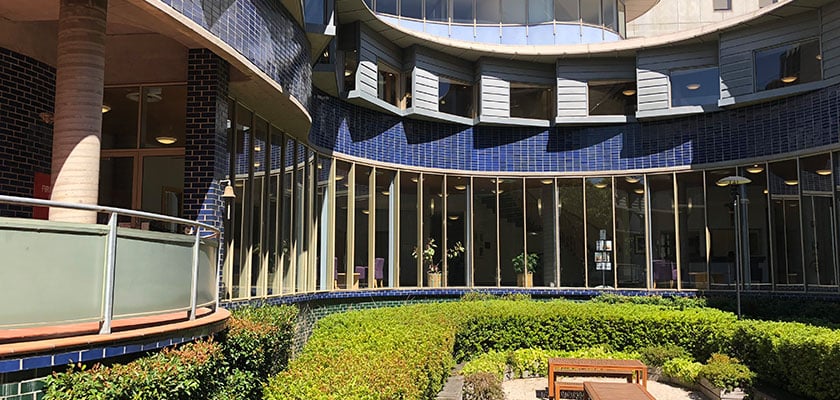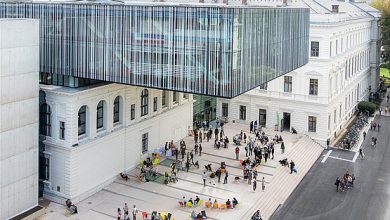University Of Divinity, Australia

Formerly known as Melbourne college of Divinity, University of Divinity stands tall as a reputable school when it comes to Christian theology globally. The institution strives to promote scholarship in Christian theology and philosophy through its colleges that are influenced and controlled by different Christian churches, ideologies and groups across Australia.
With these different colleges that offer diverse courses; diplomas, certificates and degrees are offered in divinity, undergraduate, graduate, postgraduate studies; as well as higher degrees by research. Courses offered are domained and tutored by the different colleges contained by the university in different campuses across Australia. The administrative headquarters of this institution is in Kew, Melbourne, State of Victoria, Australia.
Brief History of the University
The idea of the institution was born out initially in 1910 as Melbourne college of Divinity. In 2010, the college applied to the Victorian government under the Victorian Quality and Regulations Authority for approval to be accredited as a specialist University in Australia. The application was approved in 2011 and the college became a collegiate university in 2012, a century after the creation of the institution.
Read also: University Of Graz, Austria
Colleges in the University.
Registered as specialist university with specialization in Divinity, the university is made up of ten colleges. These ten (10) colleges offer scholarships and tutoring in the areas of theology, philosophy, counselling and ministerial and pastoral practice as related to the Christian faith. Moderation and control of this colleges are carried out by partnered churches and Christian groups. The colleges in the university are as follows:
- Australian Lutheran College, Adelaide, South Australia.
Australian Lutheran College is a Christian academy institute that provide tuition in Christian studies for church and community leaders. It prepares students for the standard and exemplary lifestyle that their faith demands through theological education. It is operated and overseers by the Lutheran Church of Australia.
- Catholic Theological College, East Melbourne, Victoria.
At Catholic Theological College, emphasis is laid on personal growth and pastoral ministry. The college also promotes faith teachings and advocates the use of Christian faith for contemporary lifestyle and development. It also boasts of it’s excellent academic standards achieved by its extreme academic curriculum. The partners of the college includes:
- Catholic Archdiocese of Hobart and Melbourne
- Catholic Diocese of Ballarat, Sale and Sandhurst
- Conventual Franciscan Friars in Australia
- Missionaries of God’s Love (Priests and Brothers)
- Missionary Oblates of Mary Immaculate in Australia
- Dominican Friars in Australia, Papua New Guinea, Solomons, and New Zealand
- Salesians of Don Bosco in Australia
- Society of Jesus (Province of Australia)
- Society of the Divine Saviour (Australia)
- Eva Burrows College, Parkville, Victoria.
Eva Burrows College is a college for and believer and lover of God’s word. The teachings here are based on the perspective of John Wesley. The college utilizes the vast experience of its teaching staff in frontline work to empower students for missionary work and ministerial service. The college is supported by the Salvation Army based in Australia.
- Morling College, New South Wales.
Morling College is a congress of men and women of distinct Christian denominations, churches and cultures. They are saddled with the responsibility of imparting knowledge of God and his service to the students.
- Pilgrim Theological College, Parkville, Victoria.
Pilgrim Theological College, a product of the Uniting Church Synod of Victoria and Tasmania, makes provision of detailed view and dynamics theology to it’s students. It’s teaching are adapted from scholars in and outside the Uniting Church in Australia (synod of Victoria and Tasmania) whom are it’s partner.
- St Athanasius College, Donvale, Victoria and Melbourne, Victoria.
St Athanasius College specialises in teaching Orthodox coptic theologies both offline (on campus) and online. It is ran in partnership with Coptic Orthodox church (Diocese of Melbourne).
- Stirling Theological College, Mulgrave, Victoria.
Stirling Theological College believes in the importance of preparing students for Christian missions, ministerial service and pastoral service. It hopes to give life-changing experiences to students by inculcating doctrinal based beliefs, fellowship and behaviours. The Church of Christ in Victoria and Church of Christ in Tasmania are it’s partners.
- Trinity College Theological School, Parkville, Victoria.
Trinity College Theological School is an anglican-based college that trains Christians that seek ordination in the church. It trains students to develop skills that produces personal fulfilment and service to the church. It’s partners are Anglican Dioceses of Ballarat, Bendigo, Gippsland, Melbourne and Wangaratta
- Whitley College, Parkville, Victoria.
Whitley College is a college that promotes spiritual growth in students by giving practical guidance in the Christian faith. It is partnered with the Baptist Union in Victoria.
- Yarra Theological Union, Box hill, Victoria.
Yarra Theological Union is traditional catholic college that welcomes all denominations in the Christian faith. The community aims to improve scholarship, ministerial care and prayer in the Christian faith. The partners of the college are:
- Blessed Sacrament Congregation (Province of the Holy Spirit)
- The Carmelites (Province of Our Lady Help of Christians)
- Congregation of the Passion
- Franciscan Friars (Province of the Holy Spirit)
- Missionaries of the Sacred Heart (Australia)
- The Redemptorists (Australia and New Zealand)
- Society of the Catholic Apostolate (Australian Region)
- Society of the Divine Word (Australian Province)
Read also: University Of Dundee, Scotland
Partners of the University
There are Thirty (30) churches and religious orders that partner with the University of Divinity. These partners provide material support to the University in two distinct ways:
- Appointing of members to the University Council
The university act stipulates that six Churches should appoint members to the University council. The churches are listed below:
- Anglican Church of Australia (Victorian province
- Baptist Union (Victoria)
- Churches of Christ in Victoria and Churches of Christ in Tasmania
- Lutheran Church (Australia)
- Roman Catholic Church (Victoria)
- Uniting Church of Australia (Synod of Victoria and Synod of Tasmania)
- Sourcing the scholar materials and resources for the University’s Colleges through provision of estates, utilities, manpower, and finances . The colleges and their partners have been outlined under the preceding subheading.
Courses
There are different accredited courses taught by different colleges in the university. The courses are taught on the campuses and offline. Duration of studies depends on the course offered by the students, the graduate level that the student belongs and Load of study (part-time or full-time).
Using the Australian qualifications framework, courses offered in the University of Divinity falls at levels 5 to 10. The University offers all its awards in Divinity and its related disciplines, in the wide scope of the community at large. Each award is offered by one or more Colleges of the University.
Students are to register in a course through a College but may take other relevant courses at other colleges of the University. Courses can be taken part-time or full-time. Lectures care also be receiving using different media: Face-to-face (taking lectures in the campuses), Online and Blended (combination of online and face-to-face).
Recognitions of the University
In 2001, the Department of Education, science and Training of the Australian government listed Melbourne college of Divinity as a Schedule 1 Higher Education Institution. Since then, it start getting funds for research study.
Moreover, it was also listed in the the Higher Education Support Act of 2003 as a Table B Higher Education Provider, thereby giving the opportunity for its students to access FEE-HELP scheme, a federally funded loan scheme to support students financially.
Till date, the University of Divinity is the only specialized university in Australia listed on the National Register of Higher Education Providers opened by the Australian federal government’s Tertiary Education Quality and Standard Agency (TEQSA)
Admission Protocol
Admission criteria
- Applicants with a college degree
Students with a previous Bachelor or Masters degree may apply to study at undergraduate or postgraduate level. Some students can also be given credit for their previous studies.
- Applicants with Victorian certificate of Education
Undergraduate applicants that have the Victorian Certificate of Education, International Baccalaureate or similarities are eligible for the undergraduate studies. Applicants with VET qualification in theology or any other similar area will be eligible for credit at the undergraduate level. Applicants without the Victorian Certificate of Education, International Baccalaureate or similarities can apply for a Diploma in Theology, and, on completion, use this Diploma as a means of going into further undergraduate studies in the university.
- Applicants that completed secondary education
It is important for applicants in undergraduate studies to have the Victorian Certificate of Education, International Baccalaureate or similarities. Australian Tertiary Admission Rank (ATAR) scores will not utilised in admitting students into the undergraduate degree.
- Applicants with work and life experience
Only applicants who have a previous undergraduate or master’s degree or the Victorian Certificate of Education, International Baccalaureate or similarities can apply for any course in the institution.
Admission Procedure
- Choose a course you wish to study.
- Check that you meet the admission criteria to study such a course.
- Choose the college you intend to study in by contacting the college adviser of that college. After contacting the adviser, you can tender your desire to study in that particular college. If you are eligible to study based on the requirements of the college, you will be invited for an interview.
NB: The admission policy stipulates that eligibility for admission into any college shall not be based on any religious tests or questions about faith and belief.
- Attend the interview scheduled by the college.
- Complete the form(s) given to you by the college adviser and submit form(s) appropriately.
- Pay School Fees.
Overseas Students
Overseas students shall
- Choose the course of the choice
- Get in touch with the college adviser of their respective course
- Apply for an Australian student visa
- Get Admission and Enrolment Forms online.
- Submit the forms
Language Proficiency Requirements
The English competency of a prospective student will be assessed either by an English language test recognized by the University or by proof that the candidate has lived a major part of his/her life in an anglophone-speaking environment
Anywhere a candidate has several English proficiency test results, only the recent test will be used for the admission process.
A course advisor may determine that a candidate undergoes an English test with other criteria fulfilled by the candidate in the admission process. Such a test may be required to ascertain whether or not to give recommendation to the applicant’s admission pursuits.
Tuition Fees
The tuition Fees varies based on the course being studied and duration of study. Here is an average amount paid annually by students in different certification categories:
- Diploma: $1704 per unit and $14,000 per annum
- Bachelor: $1704 per unit and $14,000 per annum
- Graduate Certificate: $2640 per unit and $15,840 per annum
- Graduate Diploma: $2640 per unit and $15,840pl per annum
- Masters (Theory): $2640 per unit and $15,840 per annum
- Masters (Theory and Research): $2640 per unit, $4,384 research fee and $18,432 per annum
- Masters (Research only): $6,144 research fee and $12,288 per annum
- Doctoral degree: $9,192 research fee and $18,384 per annum
- Cross Institutional Diploma (Undergraduate): $1,704 per unit
- Cross Institutional Bachelor (Undergraduate): $1,704 per unit
- Cross Institutional Graduate Diploma (Postgraduate): $2,640 per unit
Final Thoughts
Studying in the University of Divinity is a very good option for students wishing to study theology globally. As a collegiate university, admission is sought through different colleges that makes up the institution. Academic qualifications are awarded at the end of the program in divinity and their related discipline.









